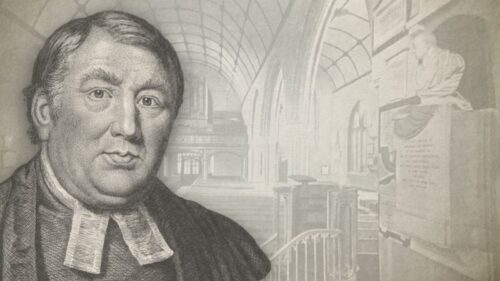
March 17—Morning Devotion
“Wherein ye greatly rejoice, though now for a season, if need be, ye are in heaviness through manifold temptations.”—I Peter 1:6
My soul! it is too difficult a task to flesh and blood, but it is among the most blessed triumphs of grace, to glory in tribulation, that the power of Jesus may rest upon the soul. Pause over the subject, and see whether in the little exercises of thy life, such things are among thine experiences. A soul must be truly taught of God the Father; truly acquainted with Jesus, and living near to him; and truly receiving the sweet and constant influences of the Holy Ghost; when, in the absence of the streams of all creature comforts, he is solacing himself at the fountain-head; and, amidst also the fiery darts of temptations! But, my soul, if this be thy happy portion, thou must have acquired it in the school of grace. There are some precious marks by which thou wilt ascertain these things. As, first – I must see that the manifold temptations, be they of what kind or number they may, are in the permissions of Jesus must trace the footsteps of Jesus in them, the hand Jesus directing me through them, the voice of Jesus must hear in them; and, in short, his sacred Person regulating and ordering all the several parts of them. If I see his love, his wisdom, his grace, his goodwill, in all the appointment; whatever heaviness the temptations themselves induce, there will still be cause left for joy – yea, for great joy. Moreover, it will be an additional alleviation to soften their pressure, if through the whole of their exercise, the soul be enabled to keep in view, that God’s glory, and my soul’s happiness, will be the sure issue of them. If I can realize Jesus’s presence, as I pass through them, and interpret, with an application to myself that blessed promise, in which the Lord saith, “I know the thoughts I think toward you, saith the Lord; thoughts of peace, and not of evil, to give you an expected end;” these mercies mingled with the trial, will sweeten, and almost take away all its bitter. And, lastly, to add no more – If, my soul, the Holy Ghost should lead out thine whole heart upon the Person of Jesus during the conflict, and by making thee sensible of thy weakness, to take shelter in him, and to lean altogether upon his strength; so that thou art able to believe and to depend upon the fulfilment of his promise, when, to the eye of sense, there doth not seem a way by which that promise may be fulfilled; these are foundations for rejoicing, and of great rejoicing too; because they are all out of thyself, and centered in Him, with whom there is no possibility of change. These are, like the Michtams of David, precious, golden things. For this is to live upon Jesus, to rejoice in Jesus, and to find in him a suited strength for every need. Blessed will be these exercises, my soul, if thou art enabled thus to act under manifold temptations.
Robert Hawker (1753-1827) was an Anglican (High-Calvinist) preacher who served as Vicar of Charles Church, Plymouth. John Hazelton wrote of him:
“The prominent features…in Robert Hawker's testimony…was the Person of Christ….Dr. Hawker delighted to speak of his Lord as "My most glorious Christ.” What anxious heart but finds at times in the perusal of the doctor's writings a measure of relief, a softening, and a mellowing? an almost imperceptible yet secret and constraining power in leading out of self and off from the misery and bondage of the flesh into a contemplation of the Person and preciousness of Christ as "the chiefest among ten thousand and the altogether lovely." Christ and Him crucified was emphatically the burden of his song and the keynote of his ministry. He preached his last sermon in Charles Church on March 18th, 1827, and on April 6th he died, after being six years curate and forty-three years vicar of the parish. On the last day of his life he repeated a part of Ephesians 1, from the 6th to the 12th verses, and as he proceeded he enlarged on the verses, but dwelt more fully on these words: "To the praise of His glory Who first trusted in Christ." He paused and asked, "Who first trusted in Christ?" And then made this answer: "It was God the Father Who first trusted in Christ."
Robert Hawker on the Biblical Covenants (Complete)
Robert Hawker's Poor Man's Morning Portions





